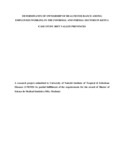| dc.contributor.author | Kirui, Elvis | |
| dc.date.accessioned | 2014-12-09T07:22:49Z | |
| dc.date.available | 2014-12-09T07:22:49Z | |
| dc.date.issued | 2014-12-09 | |
| dc.identifier.uri | http://hdl.handle.net/11295/76768 | |
| dc.description | Thesis Master of Science in Medical Statistics (MSc. Medstat) | en_US |
| dc.description.abstract | The research study sought to establish the determinants of ownership of health insurance among
people working in the informal and formal sectors in Kenya. It was guided by such specific
objectives as; to determine the factors that influence employees to own or reject an insurance; to
evaluate socio-economic factors influencing choice of health insurance by employees in Kenya;
to determine the role of information on the choice factors of health insurance and finally to
determine how location factor influences the choice of health insurance in Kenya.Thestudyfocus
on the variables that would determine the ownership of health insurance by employees in the
formal and the informal sectors. It will also outline some of the theories that have been laid down
with regard to the health insurance policies formulation and implementation. Findings revealed
significant relationship between the sector of employment and gender of the respondents χ2 (1) =
11.348, p<0.05, religion (χ2 (3) = 3.854, p>0.05), education status (χ2 (1) = 125.498, p<0.05),
marital status (χ2 (3) = 30.222, p<0.05) and health status (χ2 (4) = 13.975, p<0.05). It was also
established that there was no significant relationship between the sector one was employed in
and the status of insurance coverage for such an individual at χ2 (1) = 2.818, p>0.05 with the
odds of one being employed in the formal sector and having an insurance cover to that of one
having a cover but working in the informal sector was not significant (OR= 2.641 (0.813 –
8.577), p=0.106). Health insurance uptake considering the sector of the economy in this region is
largely dependent, and significantly so, on highest level of education and total annual
expenditure in that there is likely to be an increase in health insurance uptake among households
headed by males who have attained higher levels of education and also have higher disposable
income. Policy makers to come up with measures that cap unfavorable rates especially in the
informal sector of the economy that has derailed up take of health insurance due to stringent
rules and policies in the industry that scare away potential customers from this sector | en_US |
| dc.language.iso | en | en_US |
| dc.subject | Health Insurance | en_US |
| dc.title | Determinants of ownership of health insurance among employees working in the informal and formal sectors in Kenya case study Rift Valley provinces | en_US |
| dc.type | Thesis | en_US |
| dc.description.department | a
Department of Psychiatry, University of Nairobi, ; bDepartment of Mental Health, School of Medicine,
Moi University, Eldoret, Kenya | |
| dc.type.material | en_US | en_US |

